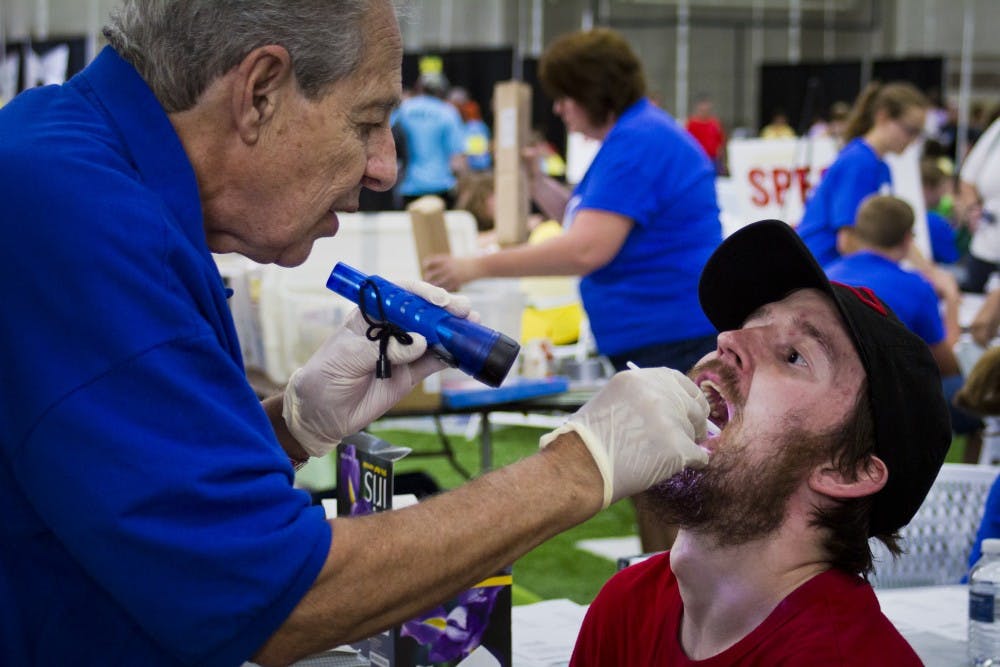Special Olympics Michigan to offer free health screenings to athletes

Special Olympics Michigan has given physician Dr. James Seals a volunteering experience like no other.
Seals has performed vision screenings on athletes for the last 15 years during the Summer Games. Getting to know the athletes is one of the best parts, he said.
"Some athletes we have watched grow up for 10-15 years. A lot of them come back every year," Seals said. "You recognize them and they recognize you. That part is kind of cool."
Healthy Athletes, a program offered by Special Olympics Michigan, provides free health screenings and other medical care for registered athletes at the State Summer Games, State Fall Games, State Poly Hockey Finals and State Winter Games.
Many athletes competing in the Summer Games aren't covered by health insurance. Special Olympics International created the Healthy Athletes program in 1997 to combat the lack of health care among athletes.
Some of the services available include check-ups in vision, oral hygiene and hearing. An "athlete village" is set up in the Indoor Athletic Complex's Turf Bay, where athletes receive services provided by volunteer health professionals. Athletes are examined after signing in when they enter the village.
"We know some athletes aren't getting healthcare, or it might not be covered by their insurance, so it's an opportunity to receive (examinations)," said Ann Guzdzial, chief program officer at Special Olympics Michigan. "It's also great training for clinical people who come in and med students. It's a win-win for everybody."
Each of these programs are run by volunteers who are doctors, medical assistants, students in the Central Michigan University audiology program, students in the Michigan College of Optometry at Ferris State University and students in the dental program at the University of Michigan, University of Detroit Mercy and Baker College.
"Sometimes an athlete can't communicate what is wrong, but a doctor can figure out the issue by testing," Guzdzial said. "We're not set up to treat patients, but if a doctor sees an issue that needs serious attention, they can take care of it by talking with the family and referring them."
Some of the volunteer doctors treat athletes outside of the games free of charge, Guzdzial said. This allows athletes to receive immediate medical attention if a problem was found during examination at the Summer Games.
"Many of our health care professionals will do pro bono work to help athletes," she said. "Last year, one of our dentists noticed an athlete wasn't acting like himself, and his pain tolerance was high. He couldn't tell anyone his problem. When the dentist looked at him, he noticed a serious infection and he got the athlete immediately to a specialist, free of charge."
At Opening Eyes, a service offered through Healthy Athletes, Seals works with athletes to check their vision, vision acuity, depth perception, eye alignment and overall health of the eyes. There are also pressure tests for glaucoma.
In 2014, Opening Eyes conducted 1, 112 vision screenings for athletes. Special Smiles performed 600 oral screenings in that same year.
In 2014, a total of 2,700 athletes had medical screenings in the village.
"Last year we saw over 1,000 athletes and gave out over 600 pairs of glasses," Seals said. "They can pick out the frames and the lenses are made right there. Athletes can pick up their glasses before they leave."
Sports and swimming goggles, sunglasses and prescription lenses are also provided. Safilo and Essilor, companies that manufacture lenses and frames, donate to Opening Eyes.
Bombas, an athletic socks company, donates socks for Fit Feet, a sub-program of Healthy Athletes. Delta Dental provides goodie bags for Special Smiles, another sub-program, and CMU will have a medical mobile unit for the sub-program MedFest.
Karen Roth, coordinator of Special Smiles, said the program is more than seeing someone who needs special attention.
"It gives people in the dental profession one-on-one time with special athletes," Roth said. "We had some dental students thinking about treating people with disabilities, and after Special Olympics, they said they wanted to do that in their practice."
Seeing the smiles on the athletes as they walk in line with their goodie bags is why she enjoys program, Roth said.
"There are a number of health areas the athletes can go to, and some come and see us every year," she said. "This is the best thing I've ever volunteered for."
Areas of Service
This year, Healthy Athletes will offer six sub-programs at the Special Olympics Summer Games that will promote healthy lifestyles, illness awareness and identify problems that may need an additional follow-up.
Opening Eyes: Vision screening, refractive testing, glasses fabrication and sunglasses and protective eyewear.
Special Smiles: Dental screenings, education about proper brushing and flossing and the importance of diet to oral hygiene, mouth guards for contact sports and referrals to community providers for necessary dental care.
Healthy Hearing: Screenings of hearing acuity, custom swim earplugs, minor hearing aid repairs, consultations on hearing aids and noisy environments and recommendations for medical or audiological evaluations.
Fit Feet: Evaluations of the skin, nails, bones and joints of the feet, examinations of the function of the feet and gait and examinations of athlete's socks and shoes.
Health Promotion: A screening that offers health information and advice in the areas of nutrition, sun safety, bone density, tobacco cessation and physical fitness. Health Promotion is designed to convey and reinforce key concepts on healthy living, healthy lifestyle choices and other health issues.
MedFest: The MedFest program recruits volunteer physicians to provide the required physical examinations for people who wish to register in Special Olympics.






